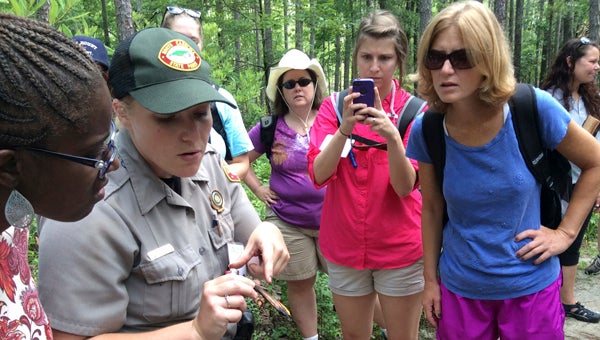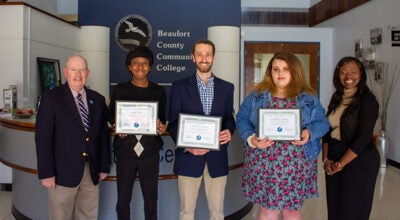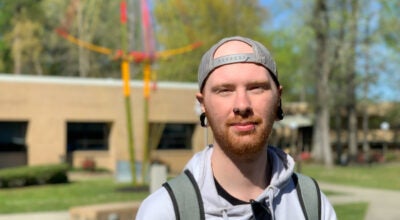Environmental program gives teachers hands on curriculum
Published 6:52 pm Tuesday, July 1, 2014

SARAH YELTON | CONTRIBUTED
HISTORY LESSON: Goose Creek State Park Ranger Nicole Crider demonstrates to teachers participating in the EGRET Fellows Program how resin bubbles out of longleaf pinewood when burned slowly. This gave an example of how tar kilns were used to make tar and pitch for the area’s shipbuilding industry in the 1800s. Pictured are (left to right) Diane Adams, Crider, Corrine West, Brittany Stewart and Dawn Guzzi.
A group of fifth grade teachers in the Tar-Pamlico River Basin recently attended a three-day workshop at Goose Creek State Park, engaging them in hands-on activities and preparing them to incorporate state curriculum requirements in outdoor learning.
During the three-day EGRET Fellows program, the group of 25 teachers participated in outdoor activities at the park. Nicole Crider, a ranger at the park, took the teachers out on a guided walk and pointed out changes in the terrain, noting the various ecosystems, Yelton said. The teachers also went on a kayaking expedition into the smaller creeks and tributaries off of the Pamlico River.
“They got to see the fish in the water, they talked about the river and saw ecosystems up close and personal,” Yelton said. “They connected with one another and did some team building so they can support each other throughout the year and implement the teachings into their own curriculums.”
The EGRET Fellows Program was held at the park through a partnership between the University of North Carolina-Chapel Hill Institute for the Environment, the park and a Time for Science Nature and Science Learning Center in Greenville, said Sarah Yelton, environmental education coordinator for the institute. The program targets teachers in the Tar-Pamlico River Basin because of the limited resources available compared to other river basins. It was funded by a two-year grant from the Eddie and Jo Allison Smith Family Foundation.
Yelton said the program helps meet the need of having teachers develop curriculums that get students hands-on involvement in the environment. The program helps teachers become comfortable with teaching outdoors in order to be able to instruct their students in an active way.
“Teachers have a lot of challenges in the classroom so we are trying to provide a way to teach their required curriculums in a new and different way to help their students get outdoors,” Yelton said. “Everything we introduced was aligned with state standards in some way. The importance of getting them outside is experiential learning. It gave teachers an opportunity to experience these ecosystems first hand which, in turn, they will teach their students.”
The program’s goal is to teach teachers how to make connections between the subjects students are learning. The curriculum teaches how to incorporate an outdoor lesson into several different subjects, including social studies, science, math and language arts. Throughout the program, teachers not only experienced science-based learning, but they also learned about early settlements in the area and how human interaction has affected the area.
“Goose Creek was a great place to start this program,” Yelton said. “There are so many ecosystems in the park and it has so much history. We talked about early settlements and how the land has changed over the last 200 years due to settlement and the use of natural resources.”
Project Coordinator Michele Drostin, who developed the curriculum, said it urges teachers to focus lessons in science around observation, asking questions and developing experiments. The curriculum gets teachers to take their students outside to explore ecosystems in their schoolyard instead of just reading about them in a book or talking about them in a classroom.
“Teachers don’t have a lot of time to take their students outside to learn, but with this curriculum, they can integrate more concepts and requirements while outside,” Drostin said.
The program will continue to support the teachers throughout the year with two workshops — one in the fall and one in the spring, Yelton said. The program will recruit a new class of teachers for the second year of the project.
If you are interested in learning more about the EGRET Fellows Program visit erp.unc.edu/water/projects-water/teachers/egret/.




